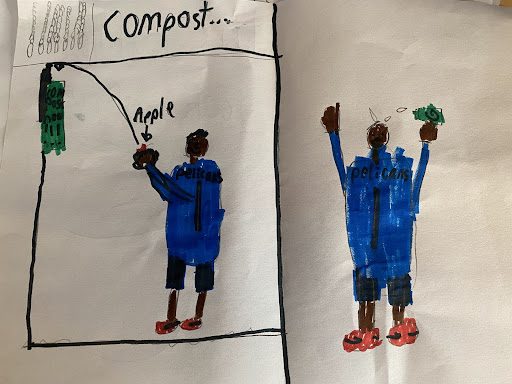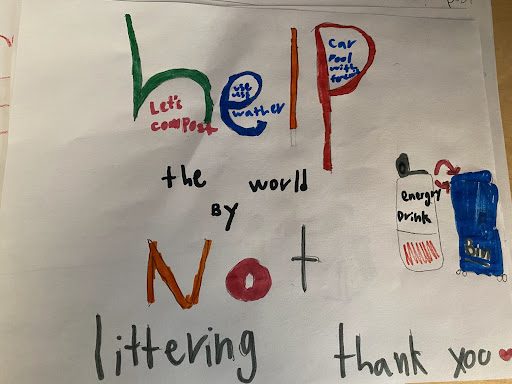By Sanju Patel ’23 and Miller Roessler ’24
This summer, Miller Roessler and I have partnered with the Evergreen Summer Camp, DA’s all day summer camp for kids ages 4 through 13. Our goal was to develop curriculum about sustainability for the campers, as well as running the compost program at summer camp. Miller and I both worked at summer camp the year before, so we were excited to get to work. We felt that instituting this curriculum was right in line with our recent conversations with the administrative team about including more sustainability in DA curriculum, which has culminated in the assigned reading for teachers this summer. With this in mind, Miller was tasked with creating curriculum for the summer, while I worked out how to bring compost to DA Summer.
Compost

Compost was a huge emphasis of the US Sustainability Committee in the past school year. We are thrilled with how it is going in the Upper School, though we’re still trying to catch up to the Middle School! Our next step was to bring that to success the Lower School and DA Summer. After determining that we would be able to have 4 compost bins at the Lower School over the summer, we chose to have compost start out in four locations: outside the camp store, outside the hock building, out front of the lower school, and back behind the lower school. We informed the rest of the staff of our plan, and most of the staff knew the basics about compost. We felt comfortable they would be able to explain how to compost to their campers, and after speaking with CompostNow to iron out the drop off and pick up of the bins, we felt ready for camp to begin. We did a small skit at morning meeting to introduce composting to the campers. However, we didn’t expect that lunch would be allowed to be eaten inside, since we started camp with an indoor mask mandate. That changed just as camp began, and the first week saw less composting than we had hoped for. Putting some bins indoors near the campers’ lunch areas brought significant improvement, and the bins started to fill up. Hopefully, we see even more composting in the last weeks of summer.
Curricululum
Diving into curriculum was a big task! We had no experience with teaching before, and trying to create lessons that kids from all ages could understand was a challenge. We struggled to highlight specific sustainability topics in the beginning with the limited resources we had, but once we did some more exploring into the large variety of books about sustainability, we came up with some exciting lesson plans. For example, in week two, we read a book called Ms. Fox’s Class Goes Green and created posters that advocated for being more sustainable.

In the next three weeks, we will do some more inspiring lessons, like learning about shared resources and finding out what plants need to survive.
We are so excited for how this summer has gone, and we are so grateful for Ms. Kantz for encouraging us to make Summer Camp more sustainable. Special thanks to Lucy Steiner and Talbot Waters for their work to make the camp store more sustainable, and to Ms. Mack for helping us with the lesson plans. We have learned a lot, and we can’t wait to improve these next few weeks and next summer.
